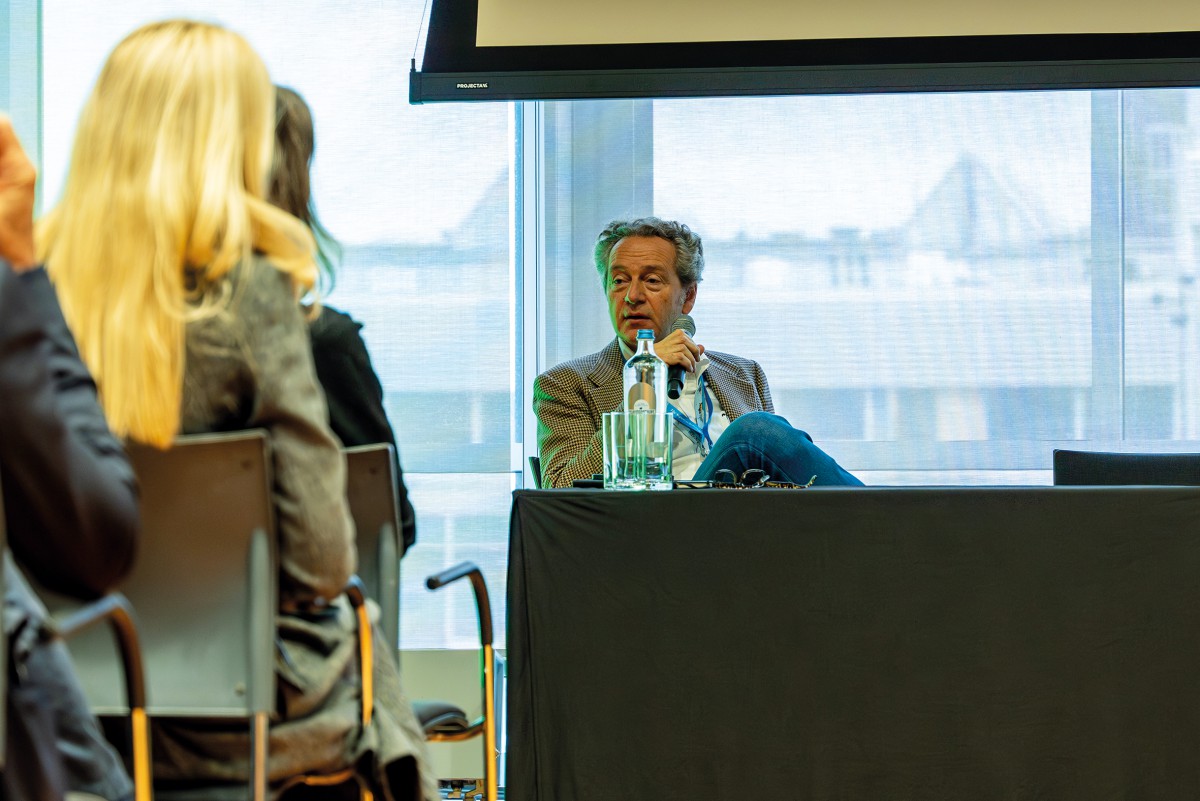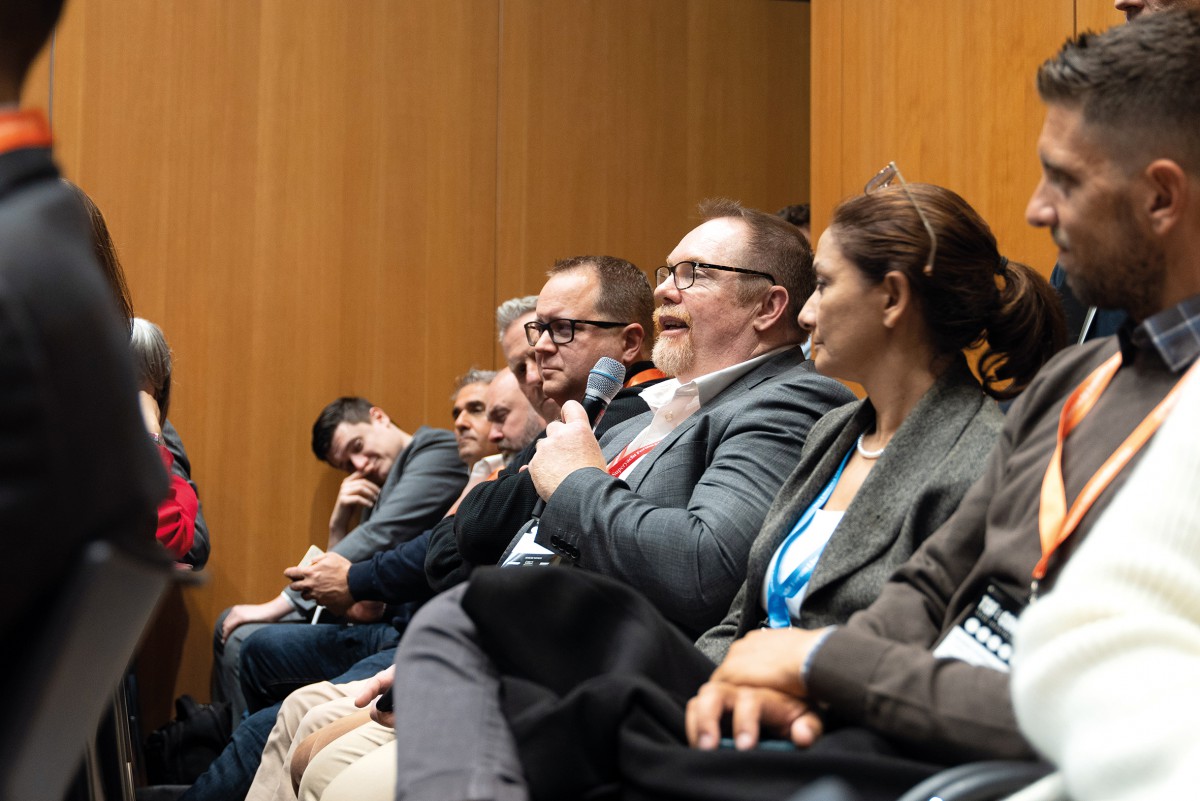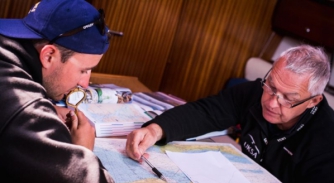Talking about our next generation
The problems of procuring and retaining new talent in the industry were painfully evident during Lürssen's TSF: Connect session…

Who said superyachts aren’t attractive? Well, according to a few silver foxes in the ‘Building Human Capital’ session at The Superyacht Forum, they’re not, and that’s to the detriment of the entire industry. The sentiment in the Green Room was divided, the line seemingly drawn between either superyachting needing to rebrand to attract new talent or that people have become too soft and scared of a hard day’s graft.
There’s perhaps an element of truth in both arguments, but what was unanimously agreed upon is that something has to be done – and soon.
This session was one of the most hotly contested discussions of the Forum and rightfully so. It aimed to address the recruitment issue that plagues the core of the industry. The workshop ran well over time and discussions continued well into the week. The fundamental issue that drove the conversation forward is how the industry can become more attractive to a new professional generation in the face of an ageing demographic.
“We need 50,000 people in the next ten years to replace those reaching retirement,” said Martin Redmayne, chairman of The Superyacht Group, as he kicked off the session. “That’s a lot of people. When you multiply that by the number of people that will support them, you’re presented with quite a large number. And it is not just quantity, but quality. Quality is of paramount importance within the whole process.”
“This is why we are here because when I look around, I see a lot of white hair or no hair at all,” added Alberto Perrone Da Zara, director of yacht services at Lürssen. “The point is, we don’t have people to build the boats anymore and I’m very concerned.”
This was the overarching issue of the session; the superyacht industry is struggling to secure and retain a skilled manual labour force. Moreover, it needs to be sourced quickly because the wide age gap between executives reaching retirement and young professionals in yachting is misaligned with the amount of talent joining the industry.
According to Ben Geary, chief operating officer at Dohle Yachts, this is an epidemic across every industry. “You’ve got the fundamental issue of not having quality workers in the shipyard,” he said. “And then you go to another level where there is a level of, to be politically correct, silver tops in senior roles and little succession planning of who is the next person to take on that role in all aspects, whether that’s design, production, management, sales.”
It would appear that the younger generation has simply become less interested in yachting as an industry. This is a shame, as for many delegates in the room, yachting was all they dreamed about from an early age. That magic has somehow been lost.
“We need 50,000 people in the next ten years to replace those reaching retirement.”
One strategy with the potential to change this is introducing people to the industry from an early age. However, the consensus was that there are very few entry points to the industry that are actually accessible for young people.
Geary added that we need to entice young people and provide them with this accessibility and said he had tried to take his daughter to a boat show after she had voiced interest in the industry but she was denied entry due to her age. Then there is the issue of financial roadblocks for other events, which usually cost hundreds of pounds, or more, to attend.
“For events like TSF, we could offer free entry to people below a certain age,” added Geary. It’s true that these events are expensive, and the cost of travel is significant too. Redmayne added that TSF and METSTRADE do have an allowance for certain young people to attend but agreed that more options need to become available.
 Alberto Perrone Da Zara, director of yacht sevices, Lürssen.
Alberto Perrone Da Zara, director of yacht sevices, Lürssen.
Another deterrent to joining the industry seems to be its perception – that the industry isn’t sexy anymore. The word ‘sexy’ was used too much at this point of the session and once would have been enough. So let’s use the term ‘attractive’ instead – how can the industry become more attractive? Well, for one, people could stop using the word sexy. Two, it could use mediums that speak to the younger generation, as TV shows such as Below Deck are often cited as a reason behind a young individual seeking employment yachting.
“So [do] we have to make a Netflix series about building boats now?” asked Da Zara. However, Pete Heggie, chief officer on a 100-metre yacht, thought this wasn’t such a bad idea. Young people no longer watch traditional TV, nor do they listen to the radio. There was a time when Lürssen’s apprenticeship scheme would have 20 applicants for every available position. Now, it can barely fill the slots, even with a radio advert that features an ‘attractive voice’.
The youth of today consume media on their phones, Instagram, TikTok and YouTube, so these are the platforms the industry should be looking to use. “My younger cousin was using a VR set driving an F1 racecar the other day. We’re not tapping into that technology either,” added Heggie. “That’s a skill that would take years and years to build. Life is very different today, and I don’t think we’re changing fast enough.”
There is a genuine fear for some yards which say they can’t compete financially for fear of bankruptcy. The fact is, we’re undeniably in competition with other industries.
One delegate said he was currently working on a TV series production that documented the goings-on of a super-yacht shipyard. Initiatives such as this will no doubt boost awareness and recruitment, but there were fears that this might detract from the fact that shipbuilding needs skilled workers, not D-List celebrities. Working in a shipyard is hard work, and to try and make the work seem superficially attractive to boost recruitment is counterproductive. Some delegates felt the age of the artisan was long gone, and that nowadays people are scared of hard days grafting in a construction shed.
One delegate, a project manager in a shipyard in Norway, said young people avoid jobs in which they get dirty. “We will start bringing in people from the age of 15 and 16 to try to get them interested because we are lacking people on all levels, from naval architects to welders. I don’t think anyone has built a hull over 40m in the last 15 years in Norway because nobody knows how to do it.”
To mitigate the lack of local talent, the shipyard is having to import workers from other countries. “We can’t get Norwegians, even though in Norway you have to pay Norwegian wages, which means you’re starting at €17 an hour,” he added.
This sentiment was shared by a considerable proportion of the room but is rather rich, particularly from those whose only experience of using a hammer was to hang up their diploma in their corner office. But the lack of skilled labour, particularly in the Western world, is a symptom of a wider issue.
Generations of parents and various governments have prioritised university education over industry for decades. This has not only led to a deficit in the labour market, and inevitably to much-needed immigration from countries that still take pride in manual labour, it’s also a complete oversaturation of talent for ‘white-collar’ jobs. People want job security, decent working conditions and to be paid well, and if other industries present better offers, then the superyacht industry has to be prepared to match them or meet its inevitable demise.
This is a genuine fear for some yards which say they can’t compete financially for fear of bankruptcy. The fact is, we’re undeniably in competition with other industries. Shipyards are going toe-to-toe with the likes of the aquaculture and oil industries, which are continuously levelling up wages and increasing rotation times. With these options on the table for a limited pool of talent, the industry must adapt to attitudes towards work in the modern era.
“I’ve been a subcontractor in this industry for forty years, but we have not changed the conditions that we work in,” said Alan Brosilow, vice president at Teakdecking Systems. “To attract good people to work alongside painters and plumbers all day long, we have to organise the projects better and provide better working conditions, especially in refit.” This might be difficult for older members of the industry to accept, but it’s a pill best swallowed now rather than further down the line at the expense entire superyacht ecosystem.
Simmering frustrations came to a gentle boil when Carla Lemaitre of Feadship and YPY voiced her content at what had been discussed. “Are we looking for people randomly because there are no people? Or are we looking for excellence?” she asked. “We are looking for the best people, not just anyone. And this is where the focus should be. Yes, we are looking for welders. But we are not just randomly looking for welders, engineers and naval architects. We are looking for the best ones, the ones that can build the best boats in the world. And we need to be doing more to get them.”
 Delegates unanimously agreed that unless the industry changes, and soon, the industry will falter and lose talent to other burgeoning industries.
Delegates unanimously agreed that unless the industry changes, and soon, the industry will falter and lose talent to other burgeoning industries.
There was no doubt that most of the room agreed that the industry demands the very best workers. But the suggestion that we selected just the best few from a pool of worldwide talent didn’t float. Heggie said you couldn’t simply pull a welder out of a hat and expect him to build an 80-metre boat perfectly. There needed to be more schemes in place for people to be trained, nurtured and, as one delegate pointed out, given the opportunity to fail. The notion that we need nothing but excellence could actually be a deterrent.
Enter Chris Frisby, director of training and operations at UKSA, a youth maritime charity aiming to make the industry accessible to everyone, particularly children from disadvantaged and inner-city backgrounds. “We work with 14- to 17-year-olds, going around schools to open up their eyes to the opportunities that are out here,” he says. “Now I don’t train them, but I can educate them. And this project is completely scalable in other countries.”
He noted that despite what some people may believe, there’s an appetite among young people in the UK to learn a trade or to work on board. UKSA has expanded from delivering its programme to 50 youngsters in 2021 to 800 now, with next year expected to surpass 8,500 teenagers nationwide. A significant proportion of graduates from its programmes have gone on to seek apprenticeships in local shipyards, work on board yachts or join the Coastguard. Some people argued that this was illustrative of what the industry needed to expand and diversify where it looked for its talent, rather than just the traditional pools in affluent coastal towns.
“When some prospective internship students, who were between 20 and 22 years old, were asked ‘Where do you see yourself in five years?’ Many couldn’t reply as they don’t know what to expect from the future.”
Others are having success with their educational schemes too. Tom de Vries, managing director at Feadship, explained that when the company invites schoolchildren to the shipyard, the invitation is extended to parents so they can see first-hand that working in a skilled manual labour is an attractive and viable career path. “Then when undertaking our apprenticeship schemes, they are trained by our craftsmen, but they also get their formal education from teachers in the local technical school. That way we have 90 to 100 young people every year that we educate and who leave the company with a diploma,” said De Vries.
What is clear is that the superyacht industry needs to become more visible to a younger generation, whether through education, integration or marketing. Dilan Saraç, of YPY, said very little was known about the industry from the outside. Many who would thrive in the industry at all levels join more visible industries instead. Attitudes have also changed, and the industry needs to adapt.
Kim Llorente, operations manager at the Professional Yachting Association, added, “When some prospective internship students, who were between 20 and 22 years old, were asked ‘Where do you see yourself in five years?’ many couldn’t reply as they don’t know what to expect from the future.”
With everything that’s happening in the world, there’s a new generation that’s filled with uncertainty. Many are searching for stability and a purpose, so by presenting a career path that is stable, interesting and adds value to people’s lives, you are far more likely to attract young, hardworking and passionate professionals.
Sometimes it seems we overthink things too. Most workers simply want a secure, well-paid job and to put down the tools of their trade at the end of the day.
Superyachting is attractive for a myriad of reasons, whether that is its innovation, craftsmanship or freedom, but the world has changed. The industry needs to wake up to the new attitudes and utilise the tools at its disposal that can help reach and retain a new generation of workers at all levels. It is on industry leaders to spearhead these initiatives, and if the leadership of a business, or an industry, doesn’t prepare for the next generation, then it doesn’t deserve to go on.
NEW: Sign up for SuperyachtNewsweek!
Get the latest weekly news, in-depth reports, intelligence, and strategic insights, delivered directly from The Superyacht Group's editors and market analysts.
Stay at the forefront of the superyacht industry with SuperyachtNewsweek
Click here to become part of The Superyacht Group community, and join us in our mission to make this industry accessible to all, and prosperous for the long-term. We are offering access to the superyacht industry’s most comprehensive and longstanding archive of business-critical information, as well as a comprehensive, real-time superyacht fleet database, for just £10 per month, because we are One Industry with One Mission. Sign up here.
Related news

MarineMax introduces new apprenticeship scheme
With skilled labour in short supply, the boating conglomerate has launched the Marine Service Technician Apprenticeship Programme in Florida
Crew

TISG announces NEWGEN
The Italian Sea Group introduces a new training programme for graduates
Business

Superyacht Alliance established
Founding members MYBA, SYBAss and IAMI, announce the new Superyacht Alliance for Professional Standards qualification
Business

Crew training budgets below par
Tim Clarke explains how recent survey results illustrate that yachts need to improve training options if they are going to retain quality crew
Crew

UKSA reports record number of students
The maritime youth charity had over 10,000 beneficiaries in its 2022/2023 training programmes, a third of which were funded
Crew
Related news
TISG announces NEWGEN
1 year ago
Superyacht Alliance established
1 year ago
Crew training budgets below par
2 years ago
UKSA reports record number of students
2 years ago
NEW: Sign up for
SuperyachtNewsweek!
Get the latest weekly news, in-depth reports, intelligence, and strategic insights, delivered directly from The Superyacht Group's editors and market analysts.
Stay at the forefront of the superyacht industry with SuperyachtNewsweek



